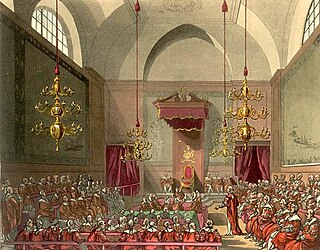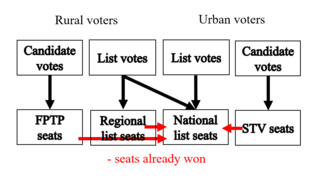Related Research Articles

Proportional representation (PR) refers to any of electoral system under which subgroups of an electorate are reflected proportionately in the elected body. The concept applies mainly to political divisions among voters. The aim of such systems is that all votes cast contribute to the result so that each representative in an assembly is mandated by a roughly equal number of voters, and therefore all votes have equal weight. Under other election systems, a bare plurality or a scant majority are all that are used to elect candidates. PR systems provide balanced representation to different factions, usually defined by parties, reflecting how votes were cast. Where only a choice of parties is allowed, the seats are allocated to parties in proportion to the vote tally or vote share each party receives.

Mixed-member proportional representation is a type of representation provided by some mixed electoral systems which combine local winner-take-all elections with a compensatory tier with party lists, in a way that produces proportional representation overall. Like proportional representation, MMP is not a single system, but a principle and goal of several similar systems. Some systems designed to achieve proportionality are still called mixed-member proportional, even if they generally fall short of full proportionality. In this case, they provide semi-proportional representation.

The Senedd, officially known as the Welsh Parliament in English and Senedd Cymru in Welsh, is the devolved, unicameral legislature of Wales. A democratically elected body, it makes laws for Wales, agrees to certain taxes, and scrutinises the Welsh Government. It is a bilingual institution, with both Welsh and English being the official languages of its business. From its creation in May 1999 until May 2020, the Senedd was officially known as the National Assembly for Wales and was often simply called the Welsh Assembly.

Electoral reform in New Zealand has been a political issue in the past as major changes have been made to both parliamentary and local government electoral systems. A landmark reform was the mixed-member proportional (MMP) system, implemented in 1996 following a public referendum.

The alternative vote plus (AV+), or alternative vote top-up, is a semi-proportional voting system. AV+ was devised by the 1998 Jenkins Commission which first proposed the idea as a system that could be used for elections to the Parliament of the United Kingdom.
Canada holds elections for legislatures or governments in several jurisdictions: for the federal (national) government, provincial and territorial governments, and municipal governments. Elections are also held for self-governing First Nations and for many other public and private organizations including corporations and trade unions. Municipal elections can also be held for both upper-tier and lower-tier governments.
At a national level, Greece holds elections for its legislature, the Hellenic Parliament.

Elections in Guyana take place within the framework of a multi-party representative democracy and a presidential system. The National Assembly is directly elected, with the nominee of the party or alliance that receives the most votes becoming President.

Legislative elections are held in Hong Kong every four years Legislative Council (LegCo) in accordance with Article 69 of the Basic Law. Legislative elections are held either at the expiry of a four-year term or when the Chief Executive dissolves the legislature and calls a new election.

The Labour Campaign for Electoral Reform (LCER) is an organisation formed of members and supporters of the British Labour Party, who are interested in issues of democratic renewal and electoral reform.

The 2006 New Brunswick general election was held on September 18, 2006, to elect 55 members to the 56th New Brunswick Legislative Assembly, the governing house of the province of New Brunswick, Canada.

The reform of the House of Lords, the upper house of the Parliament of the United Kingdom, has been a topic of discussion in UK politics for more than a century. Multiple governments have attempted reform, beginning with the introduction of the Parliament Act 1911 by the incumbent Liberal Government. When the Labour Party came to power in the 1997 general election, the Blair government passed the House of Lords Act 1999. On 7 November 2001 the government undertook a public consultation. This helped to create a public debate on the issue of Lords reform, with 1,101 consultation responses and numerous debates in Parliament and the media. However, no consensus on the future of the upper chamber emerged.

The Senate of Zimbabwe is the upper of the two chambers in Zimbabwe's Parliament. It existed from independence in 1980 until 1989, and was re-introduced in November 2005. The other chamber of Parliament is the National Assembly.
Instant-runoff voting (IRV) is a ranked voting method used in single-winner elections. IRV is also known outside the US as the alternative vote (AV). Today it is in use at a national level to elect the Australian House of Representatives, the National Parliament of Papua New Guinea, the President of Ireland and President of India. In Australia it is also used for elections to the legislative assemblies of all states and territories except Tasmania and the Australian Capital Territory, and for the Tasmanian Legislative Council.
The Royal Commission on the Constitution, also referred to as the Kilbrandon Commission or Kilbrandon Report, was a long-running royal commission set up by Harold Wilson's Labour government to examine the structures of the constitution of the United Kingdom and the British Islands and the government of its constituent countries, and to consider whether any changes should be made to those structures. It was started under Lord Crowther on 15 April 1969, Lord Kilbrandon took over in 1972, and it finally reported on 31 October 1973.
Electoral reform is a change in electoral systems which alters how public desires are expressed in election results.
There are five types of elections in the United Kingdom: elections to the House of Commons of the United Kingdom, elections to devolved parliaments and assemblies, local elections, mayoral elections, and Police and Crime Commissioner elections. Within each of those categories, there may also be by-elections. Elections are held on Election Day, which is conventionally a Thursday, and under the provisions of the Dissolution and Calling of Parliament Act 2022 the timing of general elections can be held at the discretion of the prime minister during any five-year period. All other types of elections are held after fixed periods, though early elections to the devolved assemblies and parliaments can occur in certain situations. The five electoral systems used are: the single member plurality system (first-past-the-post), the multi-member plurality, the single transferable vote, the additional member system, and the supplementary vote.

The United Kingdom Alternative Vote referendum, also known as the UK-wide referendum on the Parliamentary voting system was held on Thursday 5 May 2011 in the United Kingdom to choose the method of electing MPs at subsequent general elections. It occurred as a provision of the Conservative–Liberal Democrat coalition agreement drawn up in 2010 and also indirectly in the aftermath of the 2009 expenses scandal. It operated under the provisions of the Parliamentary Voting System and Constituencies Act 2011 and was the first national referendum to be held under provisions laid out in the Political Parties, Elections and Referendums Act 2000. Many local elections were also held on this day.

A referendum on electoral reform took place by mail-in ballot between October 22 and December 7, 2018, in the Canadian province of British Columbia. 61.3 percent of voters supported maintaining the first-past-the-post voting system rather than switching to a proportional representation voting system, which was supported by 38.7 percent of voters. This was British Columbia's third referendum on electoral reform, following ones in 2005 and 2009.

Rural–urban proportional representation (RUP), also called flexible district PR, is a supermixed electoral system which combines the use of single- and multi-member constituencies in a lower tier and top-up seats in an upper tier to meet the different needs of both rural and urban areas, while protecting the objective of proportionality. The term was coined by Fair Vote Canada, which devised a rural–urban system with the intention of meeting the special challenges of Canada's geography, which includes wide-flung, sparsely populated areas.
References
- ↑ "Government response to Committee on Legislative Democracy report". Communications New Brunswick. June 28, 2007. Archived from the original on April 11, 2010.